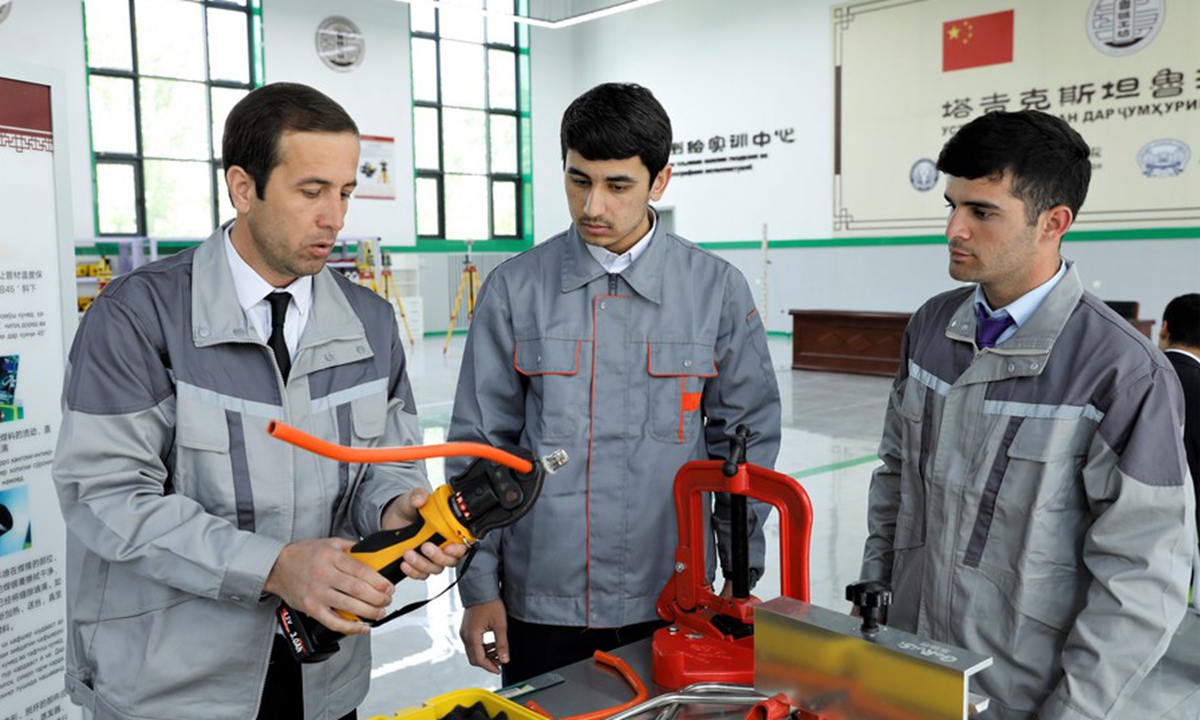
A Tajik professor introduces how to cut steel pipe to students at the Luban Workshop in Dushanbe, Tajikistan, April 12, 2023. The Luban Workshop, co-founded by China's Tianjin Urban Construction Management & Vocation Technology College and Tajik Technical University, was officially put into operation in November 2022.(Photo by Kalizhan Ospanov/Xinhua)
The year 2023 will be historic for the Tajikistan-China relationship, Guzel Maitdinova, director of the Center for Geopolitical Studies at the Russian-Tajik (Slavonic) University told Xinhua in a recent interview ahead of the China-Central Asia Summit.
This year is important as it not only marks the 10th anniversary of the establishment of a strategic partnership between the two countries, but also the 10th anniversary of the China-proposed Belt and Road Initiative, said Maitdinova.
She believes that relations between both countries have flourished, and the partnership has bright prospects ahead.
The China-Central Asia Summit will take place in Xi'an, China, and Maitdinova believes that it will be a very significant event that will contribute to the development and modernization of Central Asian states.
Maitdinova noted that the summit will also promote the coupling of the Belt and Road Initiative with the national development strategies of Central Asian countries.
She pointed out that security issues will also be critical at the upcoming summit, especially the Afghanistan issue, which would offer great contributions to regional peace and stability and have great significance for the overall development of Central Asian countries.
When discussing the Tajikistan-China relationship, Maitdinova noted that the bilateral comprehensive strategic partnership has been established on the basis of mutual respect for sovereignty, security and territorial integrity.
The two sides are committed to deeply integrating the Belt and Road Initiative with Tajikistan's National Development Strategy, with a further aim to strengthen political, economic and trade, military and technological cooperation, as well as cooperation in other fields.
Maitdinova further said that the Tajikistan-China relationship is reaching a new level of strategic coordination, continuing to give impetus to cooperation in various fields such as politics, economy, and culture.
She believes that the practical cooperation between Tajikistan and China has yielded some remarkable results in recent years. A vast number of successful projects that have been launched with China's support have had a positive impact on the Tajik people's livelihoods.
"Important projects have been implemented over the years that have contributed to Tajikistan's economic development," Maitdinova noted.
"Many national-level agreements have been signed between the two countries ... About 50 joint investment projects are being implemented in Tajikistan," she said, adding that nearly 300 Chinese companies are currently operating in the country.
Due to the joint BRI cooperation with China, Tajikistan has been able to develop its own cement production industry, and is able to export cement to other Central Asian countries. It has also successfully built a unified power grid connecting the north and south of the country with China's help.
At the same time, increased people-to-people and cultural exchanges between the two countries have also bolstered bonds between the two peoples.
"Many students from Tajikistan are studying in China," she said.
The scholar has high expectations for the future of the Tajikistan-China relationship.
"Within the framework of docking Tajikistan's national development strategy and the Belt and Road Initiative, the two countries have great potential in jointly developing the green Silk Road," she said.
"I hope to see the two countries deepen cooperation in hot areas such as climate change and environmental protection," the scholar said.
